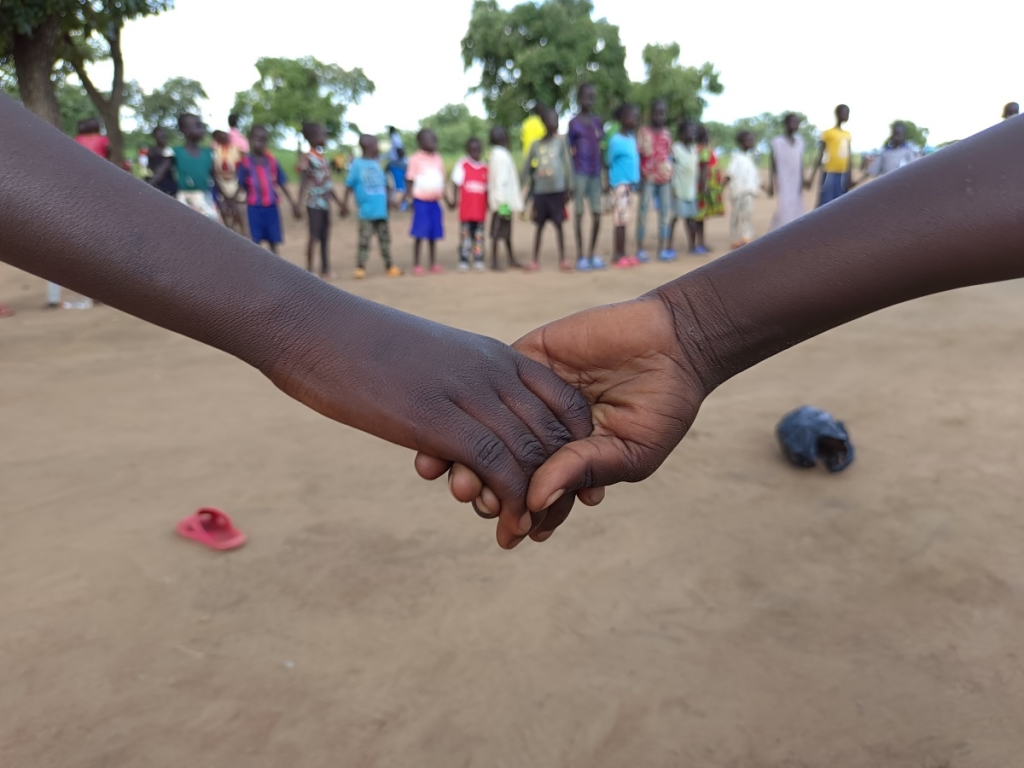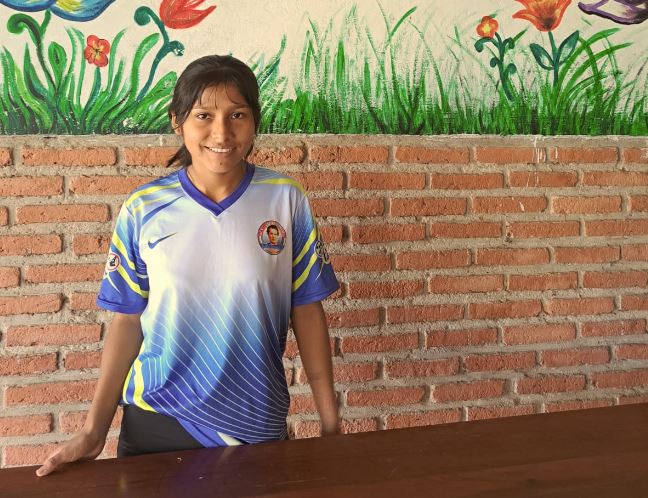WORLD TEACHERS’ DAY: Salesian Missions highlights initiatives that support and train teachers around the globe
(MissionNewswire) Salesian Missions joins with the United Nations Educational, Scientific and Cultural Organization (UNESCO) and many organizations around the globe in celebrating World Teachers’ Day. The day honors the vital role that teachers play in the lives of their students. Since 1994, World Teachers’ Day has been held annually on Oct. 5 and commemorates the anniversary of the signing of the 1966 ILO/UNESCO Recommendation concerning the Status of Teachers.
UNESCO notes that World Teachers’ Day 2018 will also mark the 70th anniversary of the Universal Declaration of Human Rights (1948) which recognizes education as a key fundamental right and establishes an entitlement to free compulsory education ensuring inclusive and equitable access for all children.
This year’s theme, “The right to education means the right to a qualified teacher,” has been chosen to highlight the importance of having trained and qualified teachers. UNCESCO indicates that there is an estimated 264 million youth out of school globally. Almost 69 million new teachers will need to be trained and hired to meet the 2030 Education Goals of universal primary and secondary education for all children. UNESCO indicates this ‘teacher gap’ is more pronounced among vulnerable populations such as girls, children with disabilities, refugee and migrant children and poor children living in rural or remote areas.
Not only is the hiring of teachers important, teacher training is also critical to student success. According to 2017 data from the UNESCO Institute for Statistics, 85 percent of primary school teachers worldwide have received teacher training. However, this number drops in poorer countries. For example, in sub-Saharan Africa UNESCO notes only 64 percent of primary school teachers are trained and in South Asia this rate reaches 71 percent.
Teachers play an important role in the lives of poor youth in Salesian schools. Their work is vital to their students’ success both in and out of the classroom. Salesian missionaries educate more than 1 million youth in over 5,500 schools and youth centers and nearly 1,000 vocational, technical and agricultural schools in more than 130 countries around the globe.
Salesian missionaries understand the importance of education in building strong sustainable societies and are dedicated to increasing the number of trained teachers where they are needed most. Not only are the Salesians a major employer of quality teachers worldwide, they also provide the training and certification teachers need. In addition, Salesian programs provide ongoing teacher training to ensure that teachers remain motivated and effective in the classroom and have their own educational needs met.
“Teachers are the backbone of the Salesian educational system and we are dedicated to providing the support and training they need,” says Father Mark Hyde, director of Salesian Missions, the U.S. development arm of the Salesians of Don Bosco. “Salesian teachers face many challenges educating poor youth. Many of their students have faced severe poverty and often have basic needs such as food, clothing and shelter. Some were previously living and working on the streets and others have faced war as child soldiers or become refugees in war torn communities. Salesian teachers meet these challenges head on, providing education and hope for a brighter future.”
In honor and celebration of World Teachers’ Day 2018, Salesian Missions is proud to highlight initiatives that help train and support teachers around the globe.
INDIA
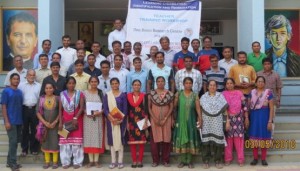 The Don Bosco Research Center in Mumbai, India, in collaboration with the Lok Seva Kendra organization in Chhota Udepur organized a day-long teacher training workshop. The workshop, held May 3, 2018 at the Don Bosco High School in Chhota Udepur, was titled, “Learning Disabilities: Identification and Remediation.” Teachers and school workers from Narukot, Kawant and Chhota Udepur participated in the workshop.
The Don Bosco Research Center in Mumbai, India, in collaboration with the Lok Seva Kendra organization in Chhota Udepur organized a day-long teacher training workshop. The workshop, held May 3, 2018 at the Don Bosco High School in Chhota Udepur, was titled, “Learning Disabilities: Identification and Remediation.” Teachers and school workers from Narukot, Kawant and Chhota Udepur participated in the workshop.
Father Ajoy Fernandes, director of the Don Bosco Research Center-Mumbai, was the resource person for the workshop and facilitated the event. He was assisted by Father Mayank Parmar, director of DRISTI Don Bosco-Kapadvanj. Through input and simulated interaction in groups, Fr. Fernandes and Fr. Parmar helped teachers to understand environmental, emotional and behavioral challenges as well as learning problems of school children. The teachers were taken through the process of recognizing, identifying, accepting and assisting a child with difficulties and were taught to encourage, support and enable these children to cope with and improve their learning ability.
Father Fernandes provided the participants with guidelines for personal and group reflection that included pertinent examples from his research of 140 schools in Mumbai and 10 other metropolitan cities across India. He also administered a pre- and post-workshop questionnaire, the findings of which will eventually be published and presented to the government of India to help alleviate the learning disabilities of school children.
REPUBLIC OF CONGO
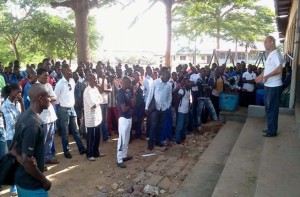 The Don Bosco Vocational Training Center in Brazzaville, the capital and largest city of the Republic of Congo*, recently launched a project in support of the modernization of vocational training. The project officially launched in May 2018 and runs through October. It aims to further develop the skills of teachers, purchase new equipment and create new vocational training workshops. The overall goal of the project is to improve the training of 21 teachers and increase student enrollment by 3,000 over the next three years.
The Don Bosco Vocational Training Center in Brazzaville, the capital and largest city of the Republic of Congo*, recently launched a project in support of the modernization of vocational training. The project officially launched in May 2018 and runs through October. It aims to further develop the skills of teachers, purchase new equipment and create new vocational training workshops. The overall goal of the project is to improve the training of 21 teachers and increase student enrollment by 3,000 over the next three years.
To better support teachers at the Don Bosco Vocational Training Center, Salesian missionaries will expand the library, address logistical problems related to the transport of teachers to and from school and improve their salaries. The project will also offer teacher scholarships to fund continuing education to improve teaching skills. Most of the training will take place abroad.
Through this project, funding will be utilized to purchase new equipment such as modern high-quality tools and instruments for courses in electro-technical, air conditioning and heating systems, lathing and welding and carpentry. The project will also purchase new tools for the creation of a driving school within the auto mechanics course in order to ensure that graduating students pass the driver’s test and have their driver’s license.
Finally, considering the demands of the local labor market and the interests of students, the training center intends to start new courses in construction, renewable energies and maintenance of computers and networks, electronic and audiovisual equipment.
SPAIN
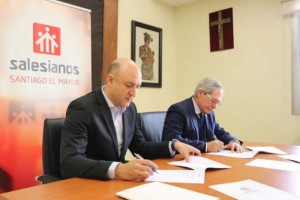 Teachers with Salesian vocational training centers in Spain will have access to additional training thanks to a partnership agreement signed between Father Juan Carlos Pérez Godoy, provincial of the Salesian Province St. James Major, and Dr. Xavier Segura, general manager of Festo Automation in Spain. An informal training partnership had already been established between the company and Salesian centers in Spain. This formal agreement solidifies Festo’s commitment to the Salesian centers.
Teachers with Salesian vocational training centers in Spain will have access to additional training thanks to a partnership agreement signed between Father Juan Carlos Pérez Godoy, provincial of the Salesian Province St. James Major, and Dr. Xavier Segura, general manager of Festo Automation in Spain. An informal training partnership had already been established between the company and Salesian centers in Spain. This formal agreement solidifies Festo’s commitment to the Salesian centers.
In addition to offering technical consultancy and training to Salesian teachers, Festo will also provide access to its materials and educational equipment. Salesian centers in Spain operate close to 50 vocational training centers with a total of 16,000 students and 1,000 teachers as well as Salesian Social Platforms that offer professional training. These training programs have been made possible by the support of companies from various sectors. In recent months, Salesians in Spain have signed collaboration agreements for professional training with other major companies including Schneider Electric, Hoffmann Group and Siemens.
VIETNAM
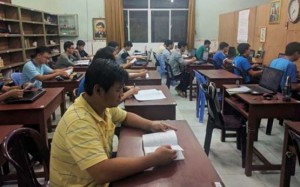 Salesian missionaries operate universities in both Ho Chi Minh City (commonly known as Saigon) and in Dalat, Vietnam that educate youth from all over the country. The universities provide vocational and technical education as well as help youth learn how to live on their own for the first time.
Salesian missionaries operate universities in both Ho Chi Minh City (commonly known as Saigon) and in Dalat, Vietnam that educate youth from all over the country. The universities provide vocational and technical education as well as help youth learn how to live on their own for the first time.
Vietnam is home to close to 100 million people with only 7 percent of them being Catholic. Salesian missionaries offer a program for both Catholic and non-Catholic students which includes academic courses as well as those that help students grow in tolerance, mutual knowledge and respect and inter-religious dialogue.
A second program is for young male Catholics who are interested in strengthening their faith and preparing themselves for a life of intense Christian commitment and religious life in the Catholic church. This year in Dalat, close to 200 students are enrolled in the first program and 50 are enrolled in the second.
Among the Catholics who followed the second vocational path, many have become lay leaders in their Christian communities, several joined the diocese as priests and a few are now members of various religious congregations including the Salesians of Don Bosco.
###
Sources:
ANS Photo (usage permissions and guidelines must be requested from ANS)
World Teachers’ Day: Quality education requires well-trained teachers
*Any goods, services, or funds provided by Salesian Missions to programs located in this country were administered in compliance with applicable laws and regulations, including sanctions administered by the U.S. Department of Treasury’s Office of Foreign Asset Control.


